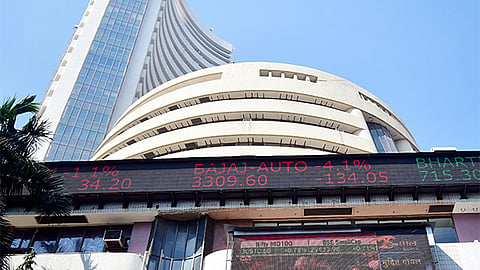Stock market crash: Investors lose Rs 7 lakh crore as Sensex cracks 1,300 points and Nifty down 400 points
Indian equity markets fell sharply on Thursday due to escalating tensions in the Middle East after Iran launched a missile attack on Israel late Tuesday.
The local benchmark indices - the BSE Sensex and NSE Nifty50 - declined more than 1.50 per cent each, resulting in a loss of about Rs 7 lakh crore as the market capitalization of all BSE-listed firms dropped to Rs 467.74 lakh crore.
The BSE Sensex plummeted more than 1,300 points, or 1.55 per cent, reaching an intraday low of 82,870. Similarly, the Nifty 50 fell about 400 points, or 1.55 per cent, hitting an intraday low of 25,383. Broader markets also faced selling pressure, with the Nifty MidCap index and the Nifty SmallCap index each falling about 1.5 per cent.
“The Indian stock market has recently seen a sharp correction from its all-time highs, driven by multiple factors. Firstly, geopolitical tensions have led to a surge in crude oil prices, which is typically negative for Indian equities. Secondly, there has been a notable outflow of Foreign Institutional Investor (FII) money from India to China over the past few days, exerting pressure on large-cap stocks,” said Santosh Meena, Head of Research at Swastika Investmart.
“Lastly, profit booking ahead of state elections and concerns over elevated valuations have added to the downward pressure,” he added.
The market is also concerned that the escalation in the Middle East could lead to higher crude oil prices, which briefly hit the USD 75 per barrel mark. Additionally, Israeli Prime Minister Benjamin Netanyahu has stated that Israel would retaliate against Iran following the killing of eight soldiers in southern Lebanon.
“The steady US market yesterday signals the market’s belief that the conflict between Israel and Iran is unlikely to impact economies and corporate earnings. However, the situation will change if Israel attacks any oil installations in Iran, which would trigger a huge spike in crude,” said V.K. Vijayakumar, Chief Investment Strategist at Geojit Financial Services.
“If it happens, it can turn out to be more damaging for oil importers like India. Therefore, investors should watch the emerging situation very closely. A partial switch in portfolios to defensives like Pharma and FMCG can also be considered,” Vijayakumar added.
He noted that FIIs may continue to sell, as Chinese stocks have turned bullish and a significant amount of money is moving into the Hong Kong market, which remains cheap compared to the high valuations in India.
In the Sensex pack, only JSW Steel and Tata Steel were trading in the green. Asian Paints, L&T, and Tata Motors were down 3-4 per cent. All sectoral indices were also trading in negative territory, with Nifty Realty and Nifty Auto taking the maximum hit.
Meena stated that while the Nifty is currently trading around its 20-day moving average (DMA) of 25,500, there is a possibility of a rebound from these levels. “However, selling pressure at higher levels remains a risk. The recent high of 26,277 is likely to act as near-term resistance, and traders are advised to adopt a 'sell on rise' strategy until the Nifty fails to sustain above the 26,000 mark. On the downside, key support levels to watch are 25,100 and 24,800.”
“For long-term investors, this correction offers a good buying opportunity in large-cap stocks, where valuations have become more attractive. We are observing sectoral rotation, with commodity-related stocks expected to perform well in the near term,” Meena concluded.
Trivesh D, COO of Tradejini said that while the US and European markets have remained flat, the impact is starting to show elsewhere, especially in the energy sector.
“Brent crude oil has risen to USD 75 a barrel from USD 70, boosting oil stocks in India. However, the broader Indian market is flashing red. Rising oil prices could add pressure on India's fiscal deficit, forcing the government to reallocate funds from key infrastructure or public welfare projects to cover the higher costs,” he added.
Gold, a traditional safe haven, is gaining traction, with the Goldbees ETF up around 0.40 per cent.
Trivesh said that if the conflict escalates, gold prices might continue rising. The India VIX, a measure of market volatility, jumped 11.4 per cent, reflecting growing uncertainty. As the situation unfolds, markets could remain volatile and it’s still unclear how global dynamics will change in the coming days, he added.

